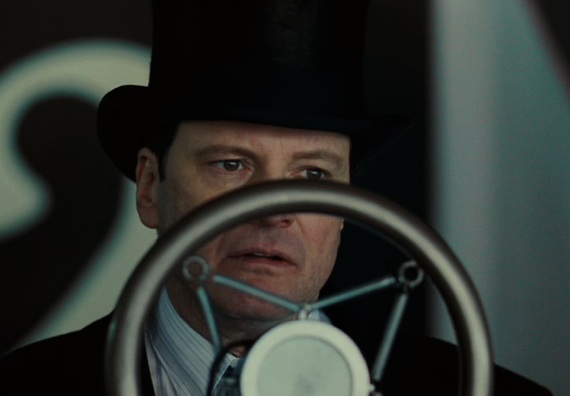Review: The King’s Speech
Compelling figures make for compelling drama. Compelling characters who feel ordinary make for award-worthy drama. The script that David Seidler assembled into “The King’s Speech” using purely research taps into a story that’s simply gold: a British monarch, whom we are accustomed to view as having an inherent infallibility, with a speech impediment that makes him seem just as human as any of us. Director Tom Hooper might be relatively new to the game, but he understands his film’s fundamental core — that we all have an impediment about which we are self-conscious, that plants seeds of self-doubt — and he seizes that empathy to create a universally delightful film.
Hooper also must’ve had a bit of fortune to work with a production crew this keen. “The King’s Speech” is dressed in pristine fashion. From set direction down to costumes, there’s a surprising amount of beauty in every shot and so much to appreciate about the effort gone into creating pre-World War II England. Standing at the center of it all as the subject of this art piece is Colin Firth, who did so similarly in last year’s “A Single Man” for which he was also nominated for an Oscar.
Firth plays Prince Albert (“Bertie”), the Duke of York, who went on to become King George VI after his father died and his elder brother abdicated. Developing a stammer at a young age, he preferred to stay out of the spotlight. As he grew older and had a family with wife Elizabeth (Helena Bonham Carter) and duty called, he needed to overcome it to be able to lead his people.
Presented with the challenge of playing a proud figure of regality with a damning flaw, Firth succeeds through and through. Between himself and Hooper’s direction, we are successfully led to identify on a personal level with this character of royalty. Yet as much as King George becomes humanized, Firth also captures that slight regal self-importance, that sense of what separates him from us, and in doing so he creates a fantastically rounded character. Bonham Carter follows suit: she presents Elizabeth as mostly wife, one concerned for yet incredibly supportive of her husband. Her priority is to show a sensible, humbled and relatable woman first, then a duchess/queen second.
To connect us to the characters and story, Hooper zooms in and out of various levels of storytelling. Sometimes we are one with the king, feeling his emotions or at times literally seeing what he’s seeing. Sometimes we take a step back from that, but still within the royal family’s trusted circle, analyzing the characters by microscope. Occasionally it’s a bit more passive as the story takes a more political turn. In the few instances when “The King’s Speech” dulls, it’s usually when that lens is in place. The story works best when its most personal, when we connect with it.
Mostly that’s whenever Geoffrey Rush graces the screen. As an Australian-born speech therapist with no medical credentials, Rush’s Lionel Logue makes for the only “commoner” in the entire film. Although his methods are unorthodox and he has a terrific sense of humor, Rush transcends the “quirky genius doctor” type, as he understands the complexity of Logue’s relationship with the king: the conflicting desire to be both humble before his majesty as well as an effective speech coach. The tension here derives from a fundamental difference in belief: whereas Bertie sees speech as a physical obstacle, Logue understands its roots are deeply psychological and tied into his personal matters. Naturally, a man of royalty would have trouble expressing private thoughts to a “common” man, but Logue breaks his shell, slowly but surely.
In part, Logue gets the King of England to understand the importance of his voice as a symbol, as the foremost expression of individuality and as something he’s entitled to possess and express. Although a king feels the strain of this importance hundred-fold, that message has value to everyone. Perhaps that theme seems elementary, but “The King’s Speech” is brilliant because we experience it, we come to see that on our own in watching sublime actors humanize royal characters and a director who captures that humanity.
—
4.5/5 Stars
—
The King’s Speech
Directed by Tom Hooper
Written by David Seidler
Starring: Colin Firth, Helena Bonham Carter, Geoffrey Rush, Guy Pearce





1 Comment
Hi
Like your page and movie reviews, good work
Jules